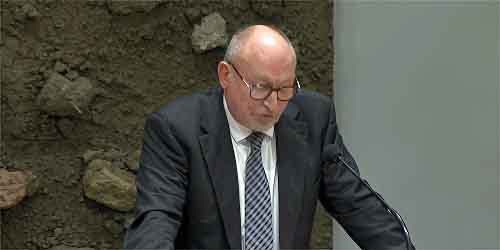Member of Parliament Peter van Haasen (PVV) argues that the millions allocated by the previous cabinet for projects related to the history of slavery would be better spent on alleviating poverty in the Caribbean Netherlands. He emphasized the need to prioritize basic needs over cultural projects.

“There is hardly any financial room in this budget,” Van Haasen stated. “Past commitments are consuming a significant part of it, including 27.8 million euros for projects addressing the history of slavery. Meanwhile, a third of the population in the Caribbean Netherlands lives below the poverty line. For them, that money could be far better spent providing essential needs, like food, rather than on cultural initiatives.”
Van Haasen clarified that his comments do not intend to deny the history of slavery, calling it “a dark chapter in our collective history.” However, he criticized what he described as “woke” language, such as the term “enslaved people,” claiming it is not taken seriously in the Caribbean region. “Parents in the Caribbean part of our Kingdom mainly want a better future for their children, with quality healthcare, safety, and education,” he said. “I therefore urge the State Secretary to explore whether the funds reserved for projects on the history of slavery can be used more creatively, to ensure tangible benefits for the local population.”
The 2025 budget for Kingdom Relations and the BES (Bonaire, St. Eustatius, and Saba) fund is not particularly prominent within the overall budget. The BES fund operates as a municipal fund for these special municipalities, enabling them to carry out their legal obligations. The government aims to apply the same rules in the Caribbean Netherlands as in the European Netherlands, under a “comply or explain” policy. However, while municipalities in the European Netherlands face budget cuts, this financial strain will not be imposed on overseas public entities.
Despite the absence of cuts, the budget does include investments aimed at the islands’ development, such as building a hurricane-resistant port in Saba and initiatives to boost the local production of fresh, healthy food across the islands. These projects aim to improve prosperity and create a more affordable and nutritious food supply.
Van Haasen praised the government’s decision not to impose strict environmental regulations that could delay vital infrastructure projects, such as road improvements on Bonaire. However, he raised concerns about the economic health of Curaçao and Sint Maarten, noting that despite debt restructuring after the 2010 constitutional reform, these islands’ debts continue to rise. He warned that this could lead to an unsustainable debt burden, exacerbated by global economic uncertainties.
Citing Article 36 of the Kingdom’s Charter, Van Haasen emphasized the responsibility to protect each other from financial distress, saying, “Helping each other also means preventing an unsustainable debt burden.”
Van Haasen returned to his earlier argument, highlighting that the 27.8 million euros allocated for slavery history projects out of a total budget of 263.4 million euros is significant. “Let’s face it: a third of the population there lives below the poverty line. For them, this money would be better spent on putting food on the table rather than on cultural projects.”
He reiterated his stance on the importance of shifting focus, saying, “We do not deny the history of slavery; it is a dark page in our collective history. But ‘woke’ terms like ‘enslaved people’ are not taken seriously even there. Families in the Caribbean part of our Kingdom need a better future for their children, with access to healthcare, safety, and education.”
During a recent committee visit to a school in Sint Maarten, Van Haasen witnessed the dilapidated state of a gymnasium, underscoring the pressing need for investments in infrastructure. “The condition was so poor, even a blind horse wouldn’t cause any damage,” he said, citing this as an example of where funds could be better utilized.
Finally, the PVV representative voiced concerns about ongoing reports of corruption and misconduct among officials on the islands. “It is absolutely unacceptable that even ministers and members of parliament are implicated in bribery, fraud, and electoral manipulation. This undermines not only the rule of law but also public trust in governance,” Van Haasen said. He emphasized that investments should support the rule of law and include stringent measures against corruption.
“Corruption must never be dismissed as part of ‘Caribbean culture,’ which is completely unacceptable,” he concluded. “Restoring trust in administration is essential for social stability and justice on the islands.”

 Saba News News and Information from Saba Island, Dutch Caribbean
Saba News News and Information from Saba Island, Dutch Caribbean
